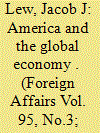|
|
|
Sort Order |
|
|
|
Items / Page
|
|
|
|
|
|
|
| Srl | Item |
| 1 |
ID:
144608


|
|
|
|
|
| Summary/Abstract |
When U.S. President Barack Obama [1] joined other global leaders at the G-20 summit in Turkey [2] in November 2015, the United States was in the final stages of a multiyear effort to secure the approval of a set of important reforms to the International Monetary Fund. The reforms, negotiated in 2010 with strong U.S. leadership, were designed to double the organization’s core financial resources to combat financial crises and to modernize its governance by increasing the voting shares of emerging-market economies [3] while maintaining a decisive U.S. voice. But their implementation had been on hold for several years, awaiting approval from Congress. Christine Lagarde, the IMF’s managing director, spoke for many when she opened the meeting in Turkey by saying she prayed that the United States would approve the reforms by the end of the year. Obama responded with a mix of levity and seriousness. “You don’t have to pray, Christine,” he said. “It will get done.”
|
|
|
|
|
|
|
|
|
|
|
|
|
|
|
|
| 2 |
ID:
148717


|
|
|
|
|
| Summary/Abstract |
The socio-economic history of Russia demonstrates that its ‘place’ in global economic relations has been subject to complex cyclical processes. The country entered the 20th century with a high growth rate and burgeoning industrialisation that included significant foreign capital. Historically exports primarily included raw materials such as grain and timber while imports consisted largely of machinery and consumer goods. The fast industrialisation and society changes involved large numbers of people in manufacturing, finally bringing success in many areas, especially education, nuclear and space studies, weaponry and health care. However, during the 20th century the general trend toward modernisation was interrupted by World War I, the Civil War, purges of the 1930s and World War II, which caused enormous loss to both the working population as a whole and, in particular, to its most creative members: the entrepreneurs and the intelligentsia. The collapse of the Soviet Union caused a further loss of industrial potential, a surge in emigration and the need to restructure socioeconomic institutions and launch a new wave of modernisation. At each such critical juncture, the country relied heavily on export of raw materials, struggled to restore human capital and defence capabilities, and was forced to import technologies and consumer goods, now and again as a century ago, while each time on a different level.
|
|
|
|
|
|
|
|
|
|
|
|
|
|
|
|
|
|
|
|
|